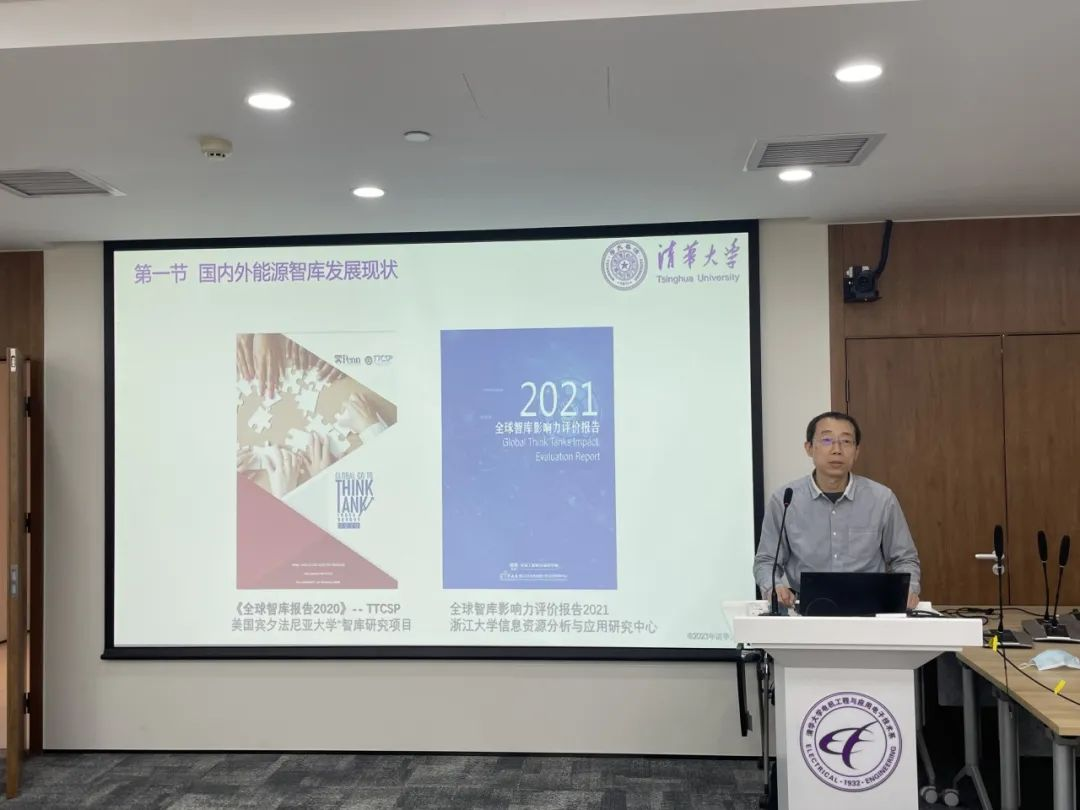On October 31, the ninth session of the Think Tank Voice Salon of the Energy Internet Research Institute of Tsinghua University was successfully held. The theme of this think tank salon was: International Energy Field Think Tank Research and Analysis. At the event, Zhao Dongyuan, director of the Engineering Application Technology Research Office of the Energy Internet Research Institute of Tsinghua University, shared his research and analysis on the development and characteristics of energy think tanks at home and abroad, and answered questions from the audience; then the participants were divided into groups to participate in the “Peak Exploration Workshop” activity and discussed “How are international first-class energy think tanks ‘made’?”. Qin Peixin, a researcher from the Energy Internet Research Institute of Tsinghua University, chaired the salon, and more than 30 teachers and students from inside and outside the school participated in the salon offline, and more than 1,500 people watched the live broadcast online.

First of all, Zhao Dongyuan shared his research and analysis on the development and characteristics of energy think tanks at home and abroad. He introduced in detail the current situation of domestic and foreign energy think tanks, and analyzed the organizational structure, operation mechanism, core business and brand products of top think tanks in the energy field.
Zhao Dongyuan pointed out that energy think tanks are important participants and influencers in the energy field, and play an important role in promoting energy transition, enhancing energy cooperation, and improving energy security. Zhao Dongyuan also summarized the common features of top think tanks, providing useful references and inspirations for the construction and development of China’s energy think tanks.
Afterwards, the teachers and students who participated in the activity had an in-depth exchange with Zhao Dongyuan on the development of energy think tanks, the role of energy think tanks in national development, industry development, etc.
At the end of the exchange, Gao Wensheng, deputy director of the Energy Internet Research Institute of Tsinghua University, presented Zhao Dongyuan with the “Thinker Medal” of the Think Tank Voice Series Salon.
In the “Peak Exploration Workshop” activity, guests from the Department of Electrical Engineering of Tsinghua University and the Energy Internet Research Institute of Tsinghua University were divided into four groups and discussed the topic of “How are international first-class energy think tanks ‘made’?”. The guests from different professional backgrounds, research directions, and working time expressed their views from different perspectives. Experts from different professional backgrounds spoke enthusiastically, brainstormed, and generated many new ideas.
The first group of guests discussed how to publicize think tanks through top experts and scholars channels, how to realize a bottom-up think tank mechanism in combination with reality, how to promote international exchanges of energy think tanks, and how to use relevant professional student resources to innovate results.
The second group of guests proposed that at this stage, they should first focus on the think tank’s strength, focus on the key issues of China’s energy research, and form a consistent “Tsinghua thought and voice”. Through international exchanges and cooperation, they should actively participate in international energy governance. They should fully stimulate the enthusiasm of Tsinghua University’s top energy experts to participate in think tank work, build think tank work teams around academicians and experts, jointly output top strategic thinking, judge key scientific and technological directions, influence the top-level design of national policies, and promote the further development of related scientific research directions, and ultimately achieve a virtuous circle of mutual promotion between think tank research and university scientific research.
The third group of guests proposed more practical development strategies, such as building an energy power database and establishing a data open sharing mechanism, actively promoting the iteration of energy power software tools, improving domestic and international influence and credibility through popular science propaganda, think tank evaluation application, and high-end think tank exchanges at home and abroad.
The fourth group of guests analyzed from two dimensions: internal and external. They suggested conducting industry and policy research externally, understanding industry trends, forming their own methodology, and building a case and policy database. They also suggested paying more attention to capacity building internally, improving writing skills, and increasing professional knowledge reserves.
This think tank voice salon activity introduced in detail the development situation, basic operation mode and core competitiveness factors of domestic and foreign energy think tank institutions, and further discussed the path and method of enhancing the influence of energy think tanks. While promoting the integration of academic resources of one system and two institutes, it also plays a positive role in the development of think tanks.